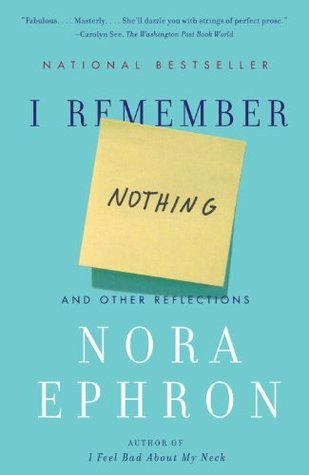More on this book
Community
Kindle Notes & Highlights
by
Nora Ephron
Read between
February 11 - February 11, 2021
He had misbehaved at some event or other and had used the word “fuck” in the course of it all. It was a big deal to say the word “fuck” in that era. This is one of the things that drives me absolutely crazy when I see movies that take place in the fifties and early sixties; people are always saying “fuck” in them. Trust me, no one threw that word around then the way they do now. I’ll tell you something else: they didn’t drink wine then. Nobody knew about wine. I mean, someone did, obviously, but most people drank hard liquor all the way through dinner. Recently I saw a movie in which people
...more
The editors of the Post wanted to sue, but the publisher, Dorothy Schiff, said, “Don’t be ridiculous. If they can parody the Post they can write for it. Hire them.”
The city room was right next to the press room, and the noise—of reporters typing, pressmen linotyping, wire machines clacking, and presses rolling—was a journalistic fantasy.
I worked at the Post for five years. Then I became a magazine writer. I believed in journalism. I believed in truth. I believed that when people claimed they’d been misquoted, they were just having trouble dealing with the sight of their words in cold, hard print.
Now I know that there’s no such thing as the truth. That people are constantly misquoted. That news organizations are full of conspiracy (and that, in any case, ineptness is a kind of conspiracy). That emotional detachment and cynicism get you only so far.
But for many years I was in love with journalism. I loved the city room. I loved the pack. I loved smoking and drinking scotch and playing dollar poker. I didn’t know much about anything, and I was in a profession where you didn’t have to. I loved the speed. I loved the deadlines. I loved that you wrapped the fish. You can’t make this stuff up, I used to say.
I’d known since I was a child that I was going to live in New York eventually, and that everything in between would be just an intermission. I’d spent all those years imagining what New York was going to be like. I thought it was going to be the most exciting, magical, fraught-with-possibility place that you could ever live; a place where if you really wanted something you might be able to get it; a place where I’d be surrounded by people I was dying to ...
This highlight has been truncated due to consecutive passage length restrictions.
This was long before the concept of having it all, but my mother had it all. And then she ruined the narrative by becoming a crazy drunk. But that came later.
They have moments when they’re still the people you grew up idolizing; they have moments when you can’t imagine they were ever anything but monsters. And then, after a while, they’re monsters full-time. The people they used to be have enormous power over you—it will be forty years before you buy a red coat (and even then, you will wear it only once)—but the people they’ve turned into have no power over you at all.
You always think that a bolt of lightning is going to strike and your parents will magically change into the people you wish they were, or back into the people they used to be. But they’re never going to. And even though you know they’re never going to, you still hope they will.
When Harry Met Sally was a huge hit and it even went into profit. We bought a dogwood. It’s really beautiful. It blooms in late June, and it reminds me of my sweet Uncle Hal.
“I cannot cut my conscience to fit this year’s patterns.”


